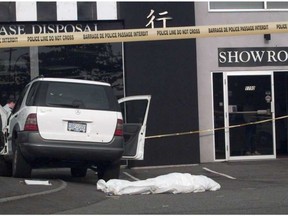REAL SCOOP: Supreme Court orders "faint hope" hearing for killer

Article content
When Bindy Johal associate Vik Chand was shot to death on Oct. 7, 1998 at a car dealership called Rags to Riches, it was big news. There had been a series of murders of people close to Johal. Just two months later Johal himself was gunned down.
RCMP homicide investigators worked the file, which led to the arrests of four people, including Simon Kwok Cheng Chow, an admitted drug trafficker who ran a pool hall called Club Dynasty. Police said at the time that he was in the Big Circle Boys and had paid off others involved in the murder. Also charge were Sameer Mapara, who owned Rags to Riches, George Wasfi and Shane Shoemaker, the actual shooter.
Another man who admitted he drove the getaway car cooperated with police and wasn’t charged.
All four accused were convicted even though Chow, Wasfi and Mapara were not at the scene of the crime. But there was phone evidence of them talking about the plot to kill Chand.
Chow, now 51, has been in jail for 17 years. He was sentenced to life with no hope of parole for 25 years. But last summer he applied to B.C. Supreme Court to get a “faint hope hearing” before a jury. This week a judge granted that application and the hearing, which could lead to him getting parole ASAP, will go ahead.
Metro Vancouver gang killer wins chance for early parole
A man convicted of first-degree murder in a high-profile gang case has won the right to have a jury decide whether he should get early parole under the “faint hope” law.
A jury found Simon Kwok Cheng Chow, now 51, was one of the men behind the gangland execution of Bindy Johal associate Vikash Chand in October 1998.
Chand was shot several times as he changed a licence plate at the Rags to Riches car lot in Burnaby.
Chow admitted he knew of the murder plot, but claimed he was not involved in it. Payments made to the killers were for a drug deal, he told the jurors who convicted him in 2001.
Chow was sentenced to a mandatory life term with no parole of 25 years. He unsuccessfully appealed his conviction to both the B.C. Court of Appeal and the Supreme Court of Canada.
Chow applied to the B.C. Supreme Court for the chance to have a “faint hope” hearing, where a jury can decide to reduce a killer’s parole ineligibility period to as little as 15 years.
B.C. Supreme Court Justice Bruce Greyell ruled this week that Chow should have a jury hear his case.
Greyell said Chow “has established on the balance of probabilities there is substantial likelihood of success that a jury will unanimously exercise its broad discretion to reduce or terminate altogether the parole eligibility for Mr. Chow.”
Greyell said Chow’s jury hearing should be held at “the earliest practicable time.”
And Greyell said the Crown will not be able to call an RCMP expert who was going to testify that Chow “was part of a Chinese organized crime criminal group” when Chand was murdered.
He said the Crown could rely on evidence from an earlier conviction “of Mr. Chow’s involvement in criminal gang activity.”
Greyell said Chow based his application for the faint hope hearing “on his personal growth and insights arising from his incarceration” and the fact he has been a model prisoner in recent years.
“Mr. Chow says he has never been a member of a gang or criminal organization while incarcerated, although this is disputed by the Crown,” Greyell said.
The Crown argued that Chow should not be allowed to have the faint hope hearing because of his “ongoing denial of his involvement in the murder of Mr. Chand” and “evidence of ongoing criminal gang connections and of a persistent criminal mindset.”
Greyell said the Crown would be able to cross-examine Chow at the jury hearing.
Three others (George Wasfi, Sameer Mapara and Shane Kelly Shoemaker) were also convicted in the Chand murder.
Shoemaker was found to be the shooter, while Wasfi and Mapara were part of the plot. A fourth man, Haddi Binahmad, admitted he drove the getaway car, but was granted immunity from prosecution in exchange for testifying.
Shortly after Chand was shot on the afternoon of Oct. 7, his drug gang associates (Bindy Johal and Bal Buttar) showed up at the car lot.
Johal was shot to death two months later, and Buttar was paralyzed in a 2001 shooting. He died several years later.





Postmedia is committed to maintaining a lively but civil forum for discussion. Please keep comments relevant and respectful. Comments may take up to an hour to appear on the site. You will receive an email if there is a reply to your comment, an update to a thread you follow or if a user you follow comments. Visit our Community Guidelines for more information.